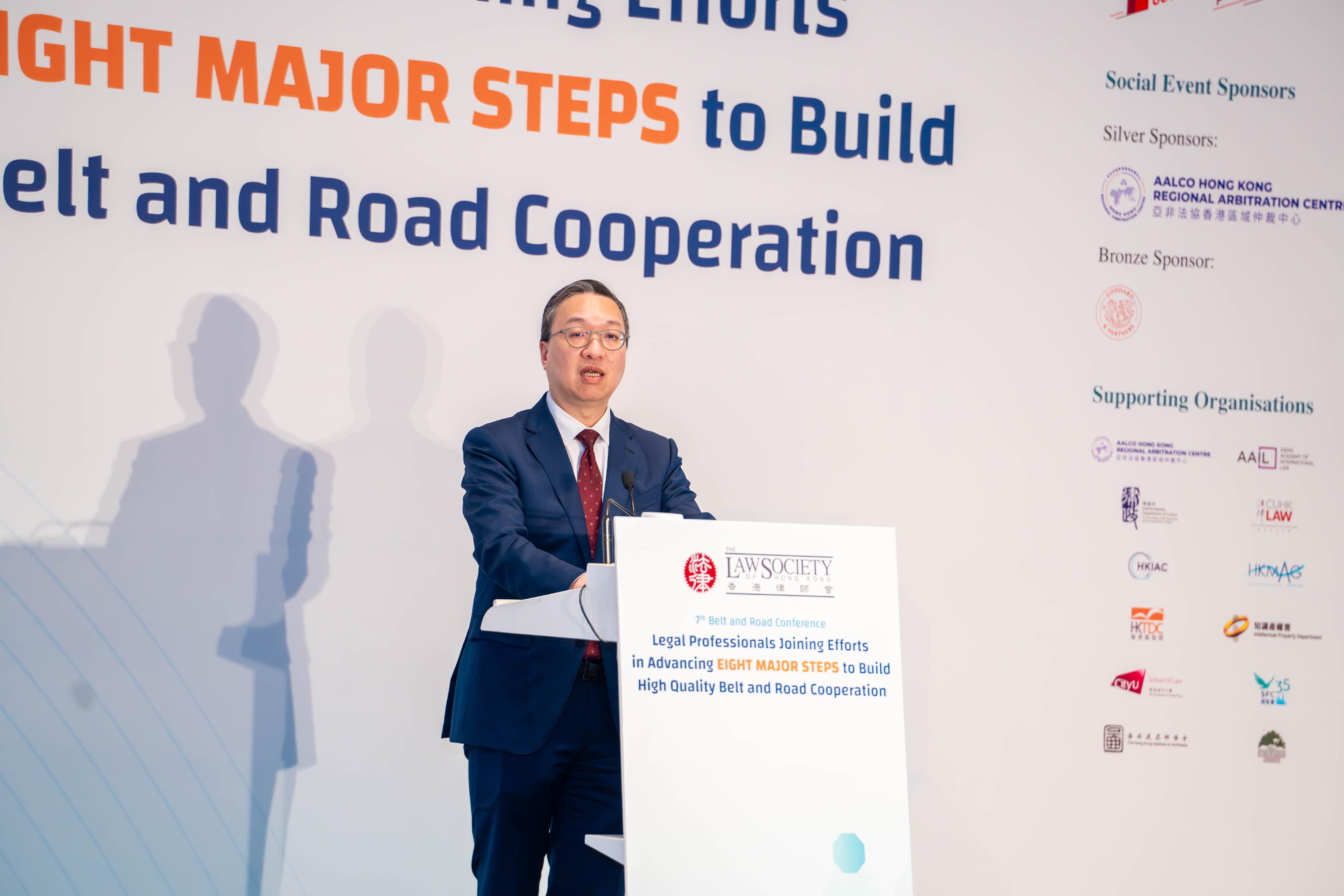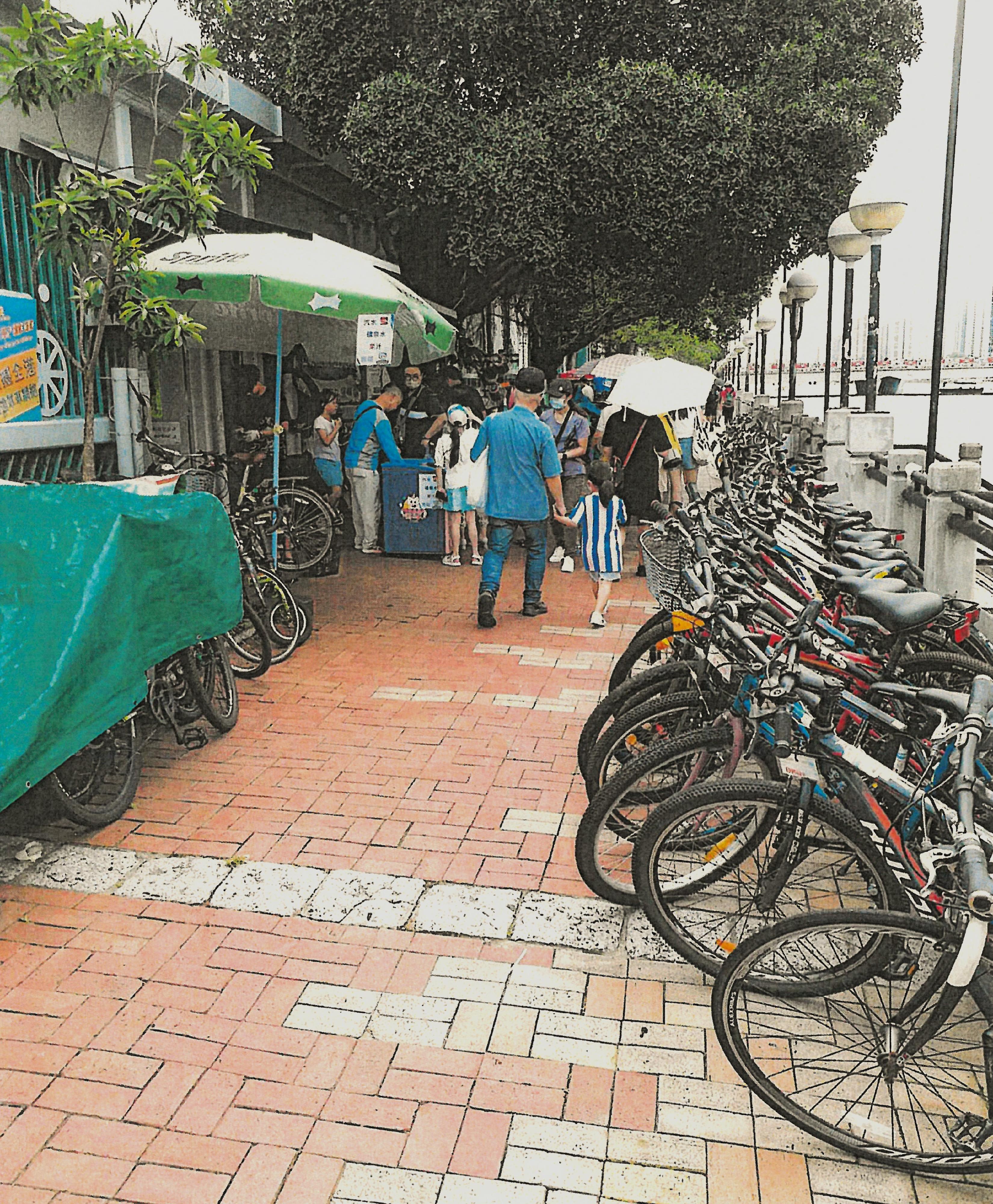Following are the opening remarks by the Secretary for Justice, Mr Paul Lam, SC, at the 7th Belt and Road Conference – Legal Professionals Joining Efforts in Advancing Eight Major Steps to Build High Quality Belt and Road Cooperation today (November 21):
President of the Law Society of Hong Kong, Mr Roden Tong, Deputy Director Mr Liu Guangyuan (Deputy Director of the Liaison Office of the Central People’s Government in the Hong Kong Special Administrative Region), Deputy Commissioner Mr Fang Jianming (Deputy Commissioner of the Office of the Commissioner of the Ministry of Foreign Affairs of the People’s Republic of China in the Hong Kong Special Administrative Region), distinguished guests, ladies and gentlemen,
Good morning. During his keynote speech at the third Belt and Road Forum for International Cooperation held in Beijing in October 2023, President Xi Jinping announced that China will take eight major steps to support the joint pursuit of high-quality Belt and Road co-operation. These wide-ranging steps span from supporting an open world economy to promoting green development and advancing scientific and technological innovation. Today, I wish to share with you my views in respect of the role of Hong Kong’s legal services in supporting the development of the Belt and Road co-operation.
Open world economy
Hong Kong ranks as the world’s freest economy among 165 economies in the Economic Freedom of the World 2024 Annual Report, up by one place from last year. Among the five areas of assessment, Hong Kong ranks top in “Freedom to trade internationally” and “Regulation”. Hong Kong retained high overall ranking in the Rule of Law Index. Our efficient and transparent market, one of the most corruption-free places in the world, as well as a world recognised regulatory regime that adheres to international standards, all contribute to a conducive environment for doing businesses.
Hong Kong’s distinction is attributable to our “one country, two systems” principle. Being the only common law jurisdiction in China, Hong Kong is renowned for having a sound and mature legal system, supported by the independent exercise of judicial power by our courts and a strong rule of law tradition. Hong Kong is uniquely positioned to bridge the gaps between different jurisdictions along the Belt and Road. As a “super connector” and “super value-adder”, Hong Kong provides world-class legal services that facilitate businesses between China and the rest of the world.
Hong Kong has a lot of talented legal professionals with a strong Chinese legal and business background, as well as expertise in international law and practice. The Department of Justice (DoJ) has also been proactive in cultivating these legal professionals. The Hong Kong International Legal Talents Training Academy, officially launched earlier this month, will regularly organise practical training courses, seminars, international exchange programmes and more to promote exchanges among talent in regions along the Belt and Road. It will also provide trainings for talent in the practice of foreign-related legal affairs for the country, and nurture legal talent conversant with international law, common law, civil law and the country’s legal system.
With our wide range of legal expertise, services and talent, Hong Kong continues to maintain and strengthen our status as an international legal and dispute resolution services centre in the Asia-Pacific region. Since 2015, Hong Kong has been ranking among the top five preferred seats for arbitration globally, and was among the top three in the latest international arbitration survey conducted by Queen Mary University, London. In May this year, Hong Kong hosted the 26th International Council for Commercial Arbitration Congress, with a record-breaking attendance of over 1 400 professionals from over 70 jurisdictions. The arbitral awards made in Hong Kong are enforceable in over 170 contracting parties under the New York Convention. At the same time, Hong Kong has entered into various mutual legal assistance arrangements with the Mainland authorities on mutual enforcement of arbitral awards as well as in interim measures agreements, which allow parties to arbitral proceedings seated in Hong Kong and administered by qualified institutions to apply to relevant Mainland courts for interim measures for preservation of property, evidence and conduct.
With the staunch support of the Central Government, we will proactively integrate into the overall national development plan, align with national development strategies, maintain and improve a free and open business environment, and continue to serve as a springboard for attracting international enterprises to Hong Kong and supporting Mainland enterprises to go global.
Green development
One major step to bolster high-quality co-operation under the Belt and Road Initiative is green development. Hong Kong is actively promoting sustainable investment by issuing a record number of green bonds and has in place a series of environmental protection policies, including the Climate Action Plan 2050, to strive to achieve carbon neutrality before 2050. As set out in the Chief Executive’s 2024 Policy Address, we will support issuance of more green and sustainable offshore RMB bonds in Hong Kong.
With the rapid growth of green development in Hong Kong, the Hong Kong Exchanges and Clearing Limited, the Hong Kong Monetary Authority and the Hong Kong Securities and Futures Commission introduced a range of policy measures and regulatory requirements on environmental, social and governance (ESG) and green and sustainable finance and banking. Regulatory requirements include enhanced ESG reporting requirements for listed companies, supervisory guidance for authorised institutions on climate risk-management, and requirements on Hong Kong fund managers on the management and disclosure of climate-related risks. Our legal expertise in banking, finance and ESG are all invaluable for these green projects, hence playing a significant role in supporting green development.
Technological innovation
Regarding technological innovation, the Government has also been actively promoting the use of artificial intelligence and is committed to keeping the law with fast-changing technological developments. In July this year, the Intellectual Property Department launched a two-month public consultation on enhancing the Copyright Ordinance (Cap. 528) to protect AI technology development.
Our legal sector has also been supporting the use of lawtech. Early this year, The Law Society of Hong Kong published a Position Paper on the Impact of Artificial Intelligence on the Legal Profession. Subsequently, the Judiciary also issued guidelines in July on the use of generative AI among judges, judicial officials and support staff.
Meanwhile, the DoJ will set up the Consultation Group on LawTech Development, comprising representatives from the legal and dispute resolution sector, law schools and lawtech solutions providers, to help the Government formulate policies and measures on lawtech, thereby encouraging the legal sector to enhance its efficiency and competitiveness with lawtech. The Group members coming from different fields can discuss how to promote the application of lawtech in the legal and dispute resolution sector, in particular for small and medium-sized law firms, as well as render advice on relevant policy measures in the promotion of lawtech development, standard and application, so as to support the Hong Kong legal profession in improving efficiency and competitiveness.
Hong Kong as a legal hub for Belt and Road co-operation
To complete the picture, Hong Kong also has reputable mediation services. It is evidenced by the selection of the city as the headquarters for the International Organization for Mediation (IOMed) intended to be established pursuant to ongoing negotiations between China and other state parties, signifying a strong vote of confidence from the international community. The IOMed will be the world’s first intergovernmental international legal organisation dedicated to resolving international disputes through mediation. It is important for the implementation of settling international disputes by peaceful means and offers a new option to all countries, including Belt and Road countries, for peaceful resolution of international disputes. The negotiations on the relevant international convention have been successfully completed. After the signing ceremony in 2025, we expect that the IOMed could start operation soon afterwards.
The DoJ has also taken steps to proactively tell good stories of Hong Kong, particularly with visits to countries along the Belt and Road. I personally led Hong Kong delegations this year to visit Saudi Arabia and the United Arab Emirates in May, as well as Vietnam and Malaysia in September, sharing with them the information concerning Hong Kong’s legal and dispute resolution services in future.
Conclusion
Ladies and gentlemen, Hong Kong’s legal services are well-positioned to support the Belt and Road Initiative. This is also echoed by Mr Xiao Weiming, Deputy Secretary General of the National Development and Reform Commission of China. At his speech given at the Ninth Belt and Road Summit held in Hong Kong in September this year, he reiterated that the Commission supports Hong Kong to reinforce and enhance its status as the international legal and dispute resolution services centre in the Asia-Pacific region, and to assist in perfecting foreign-related legal services for the joint construction of the Belt and Road. In fact, Hong Kong’s unique blend of Chinese and Western culture and expertise in international law and in dispute resolution make us an indispensable partner in the Belt and Road Initiative.
On this note, I wish you all a very fruitful and constructive conference today.




